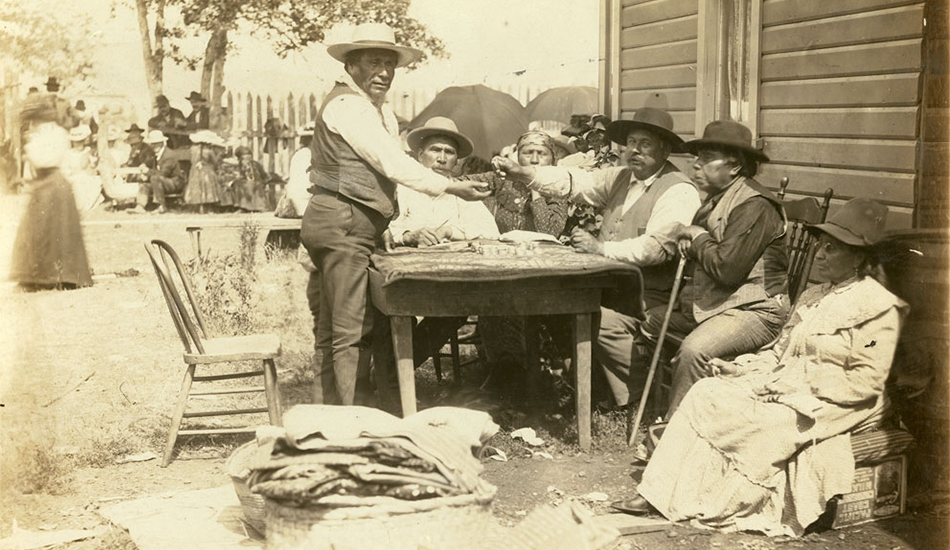A Potlatch at Alderton or Sumner circa 1902. Photo courtesy of Washington State Historical Society
By Molly Bryant, Puyallup Tribal News
One of the most deeply held traditions of Tribes in the Pacific Northwest and Canada is the Potlatch, a large celebratory gathering. The Puyallup Tribe celebrates Potlatch Days from Nov. 22 to 24 this year as days for gifting and gathering.
According to Historic Preservation Assistant Director Amber Taylor, when Tribal members called for Potlatch, it was their responsibility not only to gift people but also to make sure that they were fed, housed and cared for.
Potlatches were held for a variety of reasons. Sometimes they were held for sacred ceremonies. Other times to celebrate significant events such as a child’s birth, a young person becoming an adult, a first hunt, marriage arrangement, marriage ceremony and trade requests.
They were also held to reflect a high social status. “If you were the head of a Tribal group, you would call this gathering in an effort to prove your wealth,” said Taylor. “The purpose of the Potlatch typically is to prove your wealth by giving everything away,” she added. This was an extremely foreign concept to settlers.
Wealthy families and Tribal leaders held Potlatches to show their leadership status within the community. “It’s important to point out that the reason these individuals are leaders is from the service they gave,” Historic Preservation Director Brandon Reynon said “They served the community and therefore uplifted with gifts.”
At Potlatches, food, clothing, basketry items, tools, canoes and other essential items would be given away. Potlatches were also a way for the community to exchange vital information.
Reynon provided a relevant example of the important role Potlatch had in information sharing. “That’s how we first learned about (George) Vancouver,” he said, referring to the 18th century explorer. “He was there for several months before he came down to southern Puget Sound, but we had known he was in the area from several Potlatches that occurred previously.”
In addition to gifting, Potlatches fostered community. “You’re able to build on relationships, strengthen current relationships and develop new relationships as people … came as guests of the person that you did invite, therefore strengthening and broadening your network,” said Reynon.
At Potlatches, attendees could expect song and dance, storytelling, horse races, feasting and gaming.
Potlatches were outlawed under the Canadian Indian Act of 1884 and American laws that followed. The reasoning for holding Potlatches was widely misunderstood by non-natives.
“Christian priests believed that it would get in the way of Christianity. They saw it as a pagan, evil and heathen,” said Taylor.
Puyallup Tribal Historian Judy Wright wrote that participation in Potlatch was made an offense with a penalty of up to six months in jail.
While non-natives tried to enforce the ban, it was difficult to differentiate between a Potlatch and a regular feast. The Potlatch ban was dropped in 1934 in the United States and in 1951 in Canada.
Nowadays, Reynon and Taylor explained that the Puyallup Tribe does not hold official sacred ceremonial Potlatches. However, the Tribe still celebrates similar gatherings today, such as Powwows and Canoe Journey.
“You’re giving gifts, you’re gathering of community, you’re inviting other nations to come to your lands, or to share stories, it’s a Potlatch-like atmosphere,” Reynon said.





